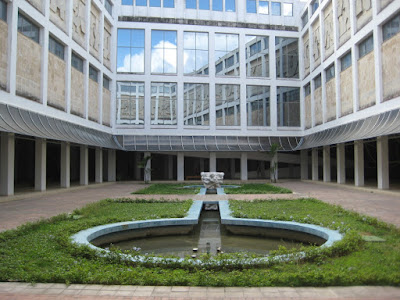Jerk
Chicken is a specialty of Jamaica. That along with Ganja (marijuana),
Lick-Two-Dominos and a host of familiar local names makes the island a surprise
even when surprises were expected. My only past connection to Jamaica was Bob
Marley and his reggae music. Aside from the song ‘Montego Bay’ the Rastafarian
experience was just a phrase clouded in mystery.
Sharon
and I were only in town for a brief stay before departing on the high seas for
a ten day cruise around the island of Cuba. Upon arrival in Montego Bay, we
traveled the narrow streets clogged with cars and Lorries to our hotel high on
a high overlooking the city.
Like
most resorts on the island, this was a gated compound with a wall separating it
from the masses and iron gates to keep them out. There was an open-air
restaurant high on a bluff overlooking the ocean, airport, and clear water
beaches below.
Like
all Caribbean islands, Jamaica is proud of its many traditions and specialties.
One of their most famous is Jerk Chicken. One of our traveling companions had
jerk chicken for lunch. Jerk Chicken is an internationally known Jamaican
specialty. It’s made with a plethora of ingredients including allspice, nutmeg,
salt, brown sugar, thyme, ginger, black pepper and vegetable oil. He said it
tasted fantastic.
Intrinsically
woven into the Jamaican experience is the Rastafarian influence as best
illustrated by Bob Marley and his music. Ganja is the Jamaican word for
marijuana. Despite having approximately 37,000 acres of marijuana fields and
some of the most idyllic growing conditions in the world, until 2015 anyone
caught in possession of the plant could face five years in jail and a fine of
US $1,500. All that changed last year when the government decided to
decriminalize small amounts of the herb.
My
own experience with ganja centered on a newspaper guy on a bicycle who first
tried to sell me the local rag sheet then when that didn’t work turned back and
offered me the ‘best weed on the island.’ He seemed truly confused when I
turned down his wonderful offer.
Rounding
every corner are enthusiastic games of dominos where four participants prepare
to ‘lick some dominos’ with the best of them. In the past, it was considered a
‘poor man’s past time’ but has now been elevated to a uber-competitive sport
played among ‘rumpanions’ gathered to shoot the breeze.
There’s
a lot of new construction going on. Jamaica like all the other Caribbean
islands is competing for the highly coveted tourist dollar. The government is
pulling out all the stops to get their fair share of that booty.
The
country is proud of its countrymen who have made their mark in the world. Well
known celebrities and personalities such as Lester Holt (NBC news), Malcolm
Gladwell (writer), General Colin Powell, and Naomi Campbell (supermodel) all
have roots in the country. Among other Caribbean countries, Jamaica still has
an uphill battle to wage for the almighty tourism dollar.
Jamaica
reminded me of Acapulco, Mexico back in the sixties when I squatted there for a
week’s R & R from my Army confinement. It was the same environment with a
lighter shade of color. ‘Don’t drink the water’ and ‘bring your own toilet
paper.’ Once you get past the mindset that ‘this isn’t America anymore’ you can
get on with the job of exploring the island.
Jamaicans
are rightly proud of their country and the progress is made. In the
ultra-competitive world of carrageen travel it’s fighting for its place in the
sun. Its native-born idiocrasies and traditions make it a ‘different place to
travel.’ Once you get past that natural inclination to seek the safe and
familiar it can be one heck of a ride.
















































